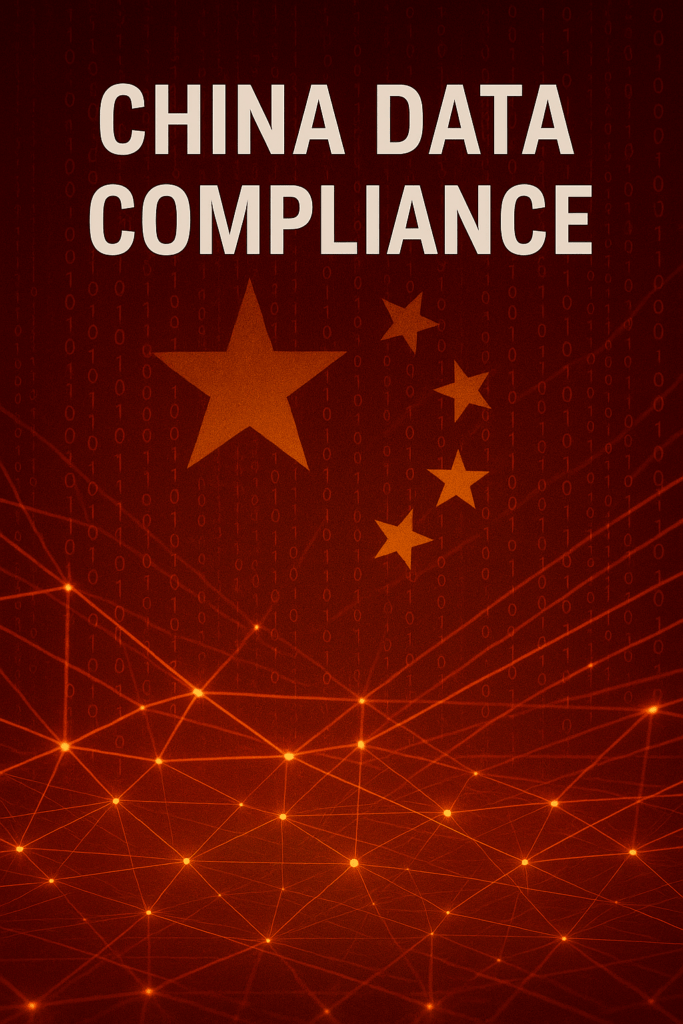| Technology based startups in the United States that are scaling fast, working with a Chinese data team, using a cloud provider with server farms in Asia, or collecting international user data through the platform often face the question of whether or not China data compliance is legally required. Technology infrastructure or data practices that intersect with mainland China, even indirectly, may be subject to some form of China data compliance. That includes how you collect, store, process, transfer, and disclose user data.
This blog breaks down the legal, operational, and policy implications for tech entrepreneurs navigating this high-stakes terrain. Why China Data Compliance Is Now GlobalChina has enacted some of the strictest and most enforceable data privacy laws in the world, with extraterritorial reach. This means companies located outside China may still fall under its jurisdiction. Key legislation includes the Personal Information Protection Law (PIPL), which serves as China’s version of the GDPR and has been in effect since 2021. There’s also the Data Security Law (DSL), which addresses how data must be classified, protected, and transferred, and the Cybersecurity Law, which governs infrastructure operators and critical data processing. If your startup hosts servers or cloud resources in mainland China, partners with Chinese entities who handle user data, offers apps or services that are accessible to Chinese users, or transfers Chinese user data to servers abroad, you may already be within the scope of these laws. The penalties for non-compliance are significant—up to 50 million RMB (around $7 million USD), or 5% of annual revenue, in addition to potential suspension of operations in China. How Startup Infrastructure Triggers Compliance ObligationsYou may not think of your startup as operating in China. But compliance isn’t based on where you are: it’s based on where your data flows. For example, your product might be hosted on Alibaba Cloud or another Chinese-based cloud provider. You may be collecting data through apps used in China but storing it in the U.S., or you might use a Chinese analytics tool that transmits personal information abroad. Even hiring a Chinese contractor with access to sensitive customer data could invoke China’s privacy requirements. All of these scenarios can potentially trigger China data compliance obligations, especially under the PIPL and DSL. Startups should conduct a data flow audit to assess their risk exposure.
|
L.A. TECH & MEDIA LAW FIRM – Intellectual Property & Technology Attorneys


David N. Sharifi, Esq.
David N. Sharifi, Esq. is a Los Angeles based intellectual property attorney and technology startup consultant with focuses in entertainment law, emerging technologies, trademark protection, and “the internet of things”. David was recognized as one of the Top 30 Most Influential Attorneys in Digital Media and E-Commerce Law by the Los Angeles Business Journal.
Office: Ph: 310-751-0181; david@latml.com.
Disclaimer: The content above is a discussion of legal issues and general information; it does not constitute legal advice and should not be used as such without seeking professional legal counsel. Reading the content above does not create an attorney-client relationship. All trademarks are the property of L.A. Tech & Media Law Firm or their respective owners. Copyright 2024. All rights reserved.
Recent Posts
TOPICS
L.A. TECH & MEDIA LAW FIRM
12121 Wilshire Boulevard, Suite 810, Los Angeles, CA 90025.
Office: 310-751-0181
Fax: 310-882-6518
Email: info@latml.com

